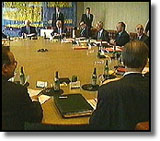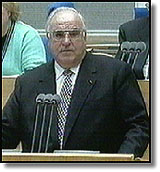
|
Euro: "No Cooking the Books"A senior European Commission official has stressed that there must be no 'cooking the books' by countries trying to meet the Maastricht economic convergence criteria for joining the Single European Currency.His statement follows the Bundesbank's claim that the German government is doing exactly that by revaluing its gold reserves. Economic Affairs Commissioner Yves Thibault de Silguy said he could not judge the Bundesbank's claim because he had not yet received detailed information about it. But he said there could be "no question" of any country fudging the figures in order to qualify, and that "the principles of the European accounting system are being applied the same in every country". Former chancellor Kenneth Clarke said he agreed with the Bundesbank's view that the revaluation of gold reserves in order to achieve the criteria would be a cheat.
Mr Clarke said that the row strengthened the argument in favour of delaying making a decision about whether to join the single currency. David Heathcoat-Amory, who resigned from John Major's government because he disagreed with official policy on the Euro, said that the project was now "doomed" on economic grounds. He said it could not be right that Germany was going to proceed using "demonstrably fiddled figures".
He said the ultimate political aim was a European superstate and the European Commission and Germany would not let "inconvenient economic facts" get in the way. "The German government will do anything to dress up the national accounts to keep this project on course," he told BBC Radio. Mr Heathcoat-Amory said he believed that Tony Blair would be equally as ruthless with the figures as Chancellor Kohl if he decided to go ahead with monetary union. "Once the political die is cast, then everything else is swept aside," he said, "That is extremely dangerous for Europe. What is absolutely certain is that the UK should have absolutely nothing to do with it."
Bundesbank Accuses Kohl
The Bundesbank's chief economist, Otmar Issling, described this as a worse trick than those employed by Italy and Spain in order to satisfy the Maastricht criteria. Mr Issling naming of those two countries was particularly pointed because the German government does not want them to join the single currency, fearing that they will weaken it, and in the past has criticised their financial machinations. But the Finance minister, Theo Waigel rejected calls for his resignation. Insisting the plan would go ahead and the Euro would start on time in 1999, he told a hastily convened news conference in his home state of Bavaria: "Germany can meet EMU criteria even without the reserve revaluation." The row has caused a political storm in Germany, with most sides accusing the government of interfering with the Bundesbank's traditional and much-cherished independence. Chancellor Kohl, however, has made it clear that he has the power and the will to force the decision through parliament and impose it on the bank. |
Diana, Princess of Wales, 1961-1997
Conference 97
Devolution
The Archive
News |
Issues |
Background |
Parties |
Analysis |
TV/Radio/Web
Interactive |
Forum |
Live |
About This Site
News |
Issues |
Background |
Parties |
Analysis |
TV/Radio/Web
Interactive |
Forum |
Live |
About This Site
© BBC 1997 |
politics97@bbc.co.uk |



